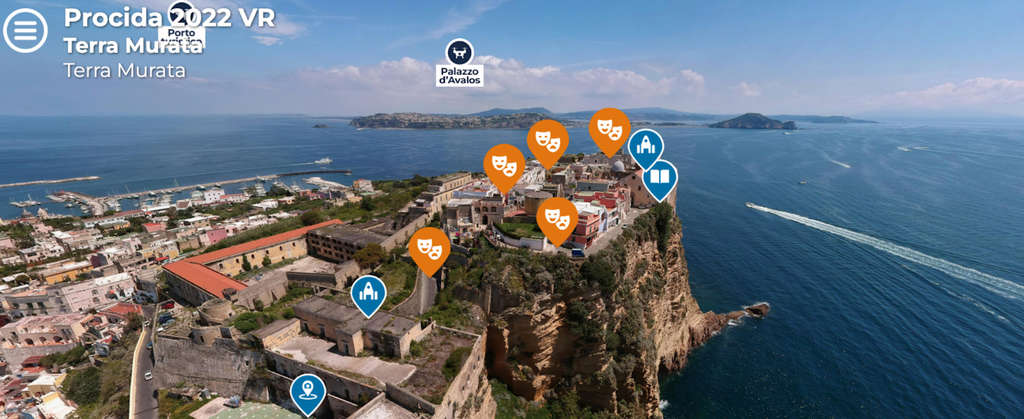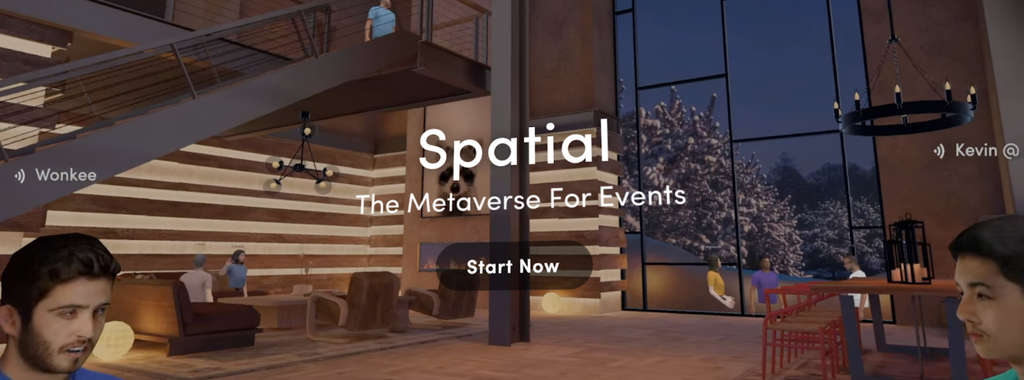Traveling Without Moving: The First Travel & Hospitality Gathering in the Metaverse
Meta, Post, After
In everyday conversation, when we refer to an event that happens “after” something else, we use the Latin prefix, “post.” “Meta” sounds more exotic, but it’s just its Greek counterpart. However, the Hellenic prefixis slightly more nuanced, as it also means “about.” Metacinema, for example, is a technique thanks to which directors can create movies “about” cinema itself. Fellini’s 8 ½ or Truffaut’s La Nuit Américaine are perfect examples of this practice. Meta-search engines? Same concept: search engines that search on other search engines. That’s what “meta” ultimately means. So, when defining a meta-universe (a meta-verse), we have to consider both connotations of the term: a universe “beyond” the one we currently inhabit and onethat’s also self-referral.
- A post-universe.
- A meta-universe.
- In a word: a metaverse.
- Metaverse Killed the Travel Stars. But did it?
If you’re reading this, chances are you already know a little about the metaverse and its fictional origins as well, so I will not overkill it. If you don’t, however, it’s worth mentioning that a novel written 30 years ago is now on Amazon’s ten best-selling books under the “Computers & Internet” category and no longer under “Sci-fi,” where it belonged(truth to be told, something similar happened with Orwell’s 1984 and Huxley’s Brave New World, even though for different reasons). However, in our industry, the simple act of thinking about the metaverse (or, more precisely, A metaverse) is enough to generate a peculiar paradox: because the metaverse is, par excellence, the ultimate ANTI-travel dystopia. Well, at least on paper. Cambridge Dictionary defines travel as “to make a journey, usually over a long distance.” In the metaverse, au contraire, there are no distances at all. The central concept of space is nonsensical in a virtual environment. That’s why most people in our industry are still skeptical of its practical applications: if you erase one essential part (the distance) from the travel equation, only the journey remains. And so does the question: is traveling without moving, still traveling? Or is it something else?
Post-Travel, Part I: Reality
On the other hand, the pandemic exposed all of our industry’s vulnerabilities. And if that’s true that a “man cannot discover new oceans unless he has the courage to lose sight of the shore” (André Gide), it is also true that, according to an IDC research, the worldwide market for augmented and virtual reality headsets grew 92.1% YoY in 2021. So the time might have come to reconsider what we (think) we know about the concept of reality, discovery, and, ultimately, how we travel. In his latest book, Reality+, technophilosophist David Chalmers theorizes that virtual reality is ALSO reality. According to Chalmers, in just a few decades, VR (and, consequently: the metaverse) will become so indistinguishable from physical reality to the point that it will be meaningless to differentiate between the two. Still doubtful? Let me put it differently: reality (with capital “R”) is just a form of consensus among individuals. It’s only real what is considered to be real according to an arbitrary agreement amongst us. Esse est percipi. So, is traveling to a virtual destination still traveling? Well, it all depends on what we agree upon. And nothing has meaning per se.

Post-Travel, Part II: Sustainability
Suppose you prefer a more practical explanation for this surge in interest around the metaverse and its possible applications in travel. In that case, it’s also worth mentioning the increased awareness of our industry’s impact on the environment. “Carbon emissions from the airline industry,” writes climate policy analyst Tom Green, “grew by 75 percent from 1990 to 2012. It’s expected they will continue to grow rapidly until 2050. If left unchecked, they could consume a full quarter of the available carbon budget for limiting temperature rise to 1.5 C.”. I don’t want to get all gretathunbergy here, but it makes you reconsider your role in the industry. Your role in the world. Professor Stephen Hawking predicted that the Earth could become inhabitable by as soon as 2600. Let’s do the math: the average life expectancy exceeds 72 years. We are, at least mathematically, just a few generations away from mass extinction. So finding practicable alternatives to an environmentally harmful industry like ours is not only desirable. It’s mandatory, at this point.
Evolution, not Revolution
That being said, the metaverse will unlikely replace traveling tout-court, but it will definitely play some kind of role in it, especially in the early, top-funnel micro-moments of the traveler’s journey (“I-want-to-go-away”https://www.hospitalitynet.org/”Inspiration”https://www.hospitalitynet.org/”Planning”). While we currently pick a hotel founding our decision on photos, videos, and reviews only, the metaverse could provide a more immersive experience, and allow us to “visit” a destination, book a hotel room or a restaurant table, bookmark a museum while sitting on our couch, and -then- live the experience IRL. It’s travel research on steroids. No static image, 2D video, or website will ever be able to deliver an equivalent experience. Recently, even my native Country, which is not usually known to be particularly tech-savvy (that’s a euphemism), launched an immersive experience to one of the islands off the coast of Naples (grab a headset and enjoy it here: procida2022vr.com). Sure, if I want to eat the best pizza in the world, I still have to physically go there. However, I can now explore the city beforehand and reserve my table at Sorbillo’s directly inside the Naple-verse. It’s the next level of the “try before you buy” concept. The metaverse offers new vectors for advertisers and marketers alike, and they should not be underestimated, no matter how we feel about a virtual universe.

Metaverse will not destroy travel. It will complement it.
And the applications are limitless: want to visit the Ciudad Perdida, Atlantis, or Ancient Rome? You can travel back in time and experience something you can no longer do in the physical world (aka the “meat space”). Wanna check another planet out? Yup. Inspect your meeting room two weeks before the actual congress? Sure! Can the metaverse help persons with reduced mobility (PRM) take that trip they always dreamt of? You bet. Want more? Virtual booking engines, fueled by cryptos and NFTs, could completely change (for the better) the booking process as we know it. Enhanced booking experience, digital conciergerie, hybrid MICE, travel equity, immersive marketing… The list goes on and on. The “embodied internet” is virgin territory for our industry (for any industry, for that matter), and we’re still in the embryo stage of the technology. More evidence? According to Bloomberg, the metaverse may be an $800 billion market, 200 more than the global business travel market size. Let this info sink for a second…

May 20th – The First Travel Webinar in the Metaverse is Coming!
Now that you understand better the implications for our industry, and I (hopefully) separated the hype from reality, it’s time for the big announcement: HospitalityNet, together with my consulting firm (Travel Singularity, travelsingularity.com), and Olimaint, are launching the first-ever travel webinar on the metaverse. Make no mistake: this is NOT a webinar ABOUT the metaverse; this will be a webinar INSIDE the metaverse. The list of confirmed speakers grows day after day, to the point that we decided to have two events, one in the morning and one in the afternoon. Here are just a few of the “avatars” speaking:
- Floor Bleeker, CIO, Accor
- Alexander Edström, CEO, Atomize
- Antonio Picozzi, CEO, Takyon
- Brendan May, Managing Director, Hotel Res Bot
- Daniel Craig, Founder, Reknown
- Jan Hejny, CEO & Founder, HotelTime Solutions
- Juanjo Rodriguez, Founder, The Hotels Network
- Michael Robinson, Product Marketing Manager, Chainlink Labs
- Pablo Delgado, Founder, Mirai
- Paula Marie Kilgarriff, Metaverse Brand Activation Strategist
- Sébastien Felix, Founder, Influence Society
- Stephen Burke, Founder, RobosizeMe
As an extra reward for these pioneers, HospitalityNet, Travel Singularity, and Olimaint will create commemorative NFTs as a gift to all the speakers. Roberto Garavaglia, one of the most authoritative voices on crypto, NFTs, and blockchain in Europe, joined the project to ensure each speaker gets a special reminder of the event.
How can you attend? How can you enter the Metaverse?
So here’s the big question. This may sound overwhelming if you’re not familiar with how the metaverse works, but it’s actually pretty simple. You can join the event by simply clicking on a link on your computer (and you will see a 2D version of the event) or BE TOGETHER WITH US in one of the world’s most iconic locations: Trinità dei Monti, in Rome, Italy. Well, at least, in a virtual version of it. HospitalityNet rented the iconic DolceVita double staircase for the whole day, so, between the two events, as an extra perk, you can visit (for free) a version of Rome you’ve never have, or just hang out with us for as long as you like. We’re also organizing a social gathering after each event, so we’ll be in the metaverse pretty much all day long.
So, if the latter option is tempting, just follow these simple steps:
- Of course, if you want the full, immersive experience, you’ll need a VR headset, such as Meta Quest. If you already have one, just download the Spatial app and create your avatar, as explained above. A link to the event will be shared in the coming days, but, in the meantime, feel free to hang out and meet me at my “apartment,” here: https://spatial.io/s/Simone-Puortos-Home-623b6422adfe840001620429. If you drop me a message, we can schedule a metaverse meeting so you start familiarizing yourself with the app;
- If you’re not ready to invest in a piece of tech that you’re not going to use anytime soon, there’s an alternative that is also quite immersive: simply plug your phone into an inexpensive pair of VR goggles. You can buy one for Amazon starting at 10€. Once done, simply download the Spatial app, create the avatar, and plug your phone into the goggles (here’s a tutorial on how to set it up: https://www.youtube.com/watch?v=_LuyQV_iSJk);
- If you just want to check out the event, but you still want to interact with us, here are all the instructions on how to move in Spatial from a desktop/laptop: https://www.youtube.com/watch?v=tdnSQcCkuo0.
Our suggestion is that you start experimenting with Spatial and find what’s most comfortable for you. And, by the way… there are NO LEGS in most metaverses, so don’t freak out when you create your avatar!
Both I and all the staff at HospitalityNet are at your disposal if you have questions. It took us months to organize the event, pick the right platform, rent the coolest location, etc. So there’s definitively a learning curve to go through, and we want to make sure as many people as possible can join the metaverse revolution.
We’re ready. Are you? – Click here to register for HN Meta Meetup

Simone Puorto
Travel Singularity
Recent Posts
- Danny Pomanto Sebut Banjir di Makassar Kali Ini Cukup Parah
- Scenic Group reveals new year cruise offers
- Kemenekraf Proyeksikan Tiga Tren Ekonomi Kreatif pada 2025
- HOTLIST 2024 Successfully Concludes Its Official Event Series
- Albania to ban TikTok for a year as PM Edi Rama claims app inciting violence and bullying | World News
Recent Comments